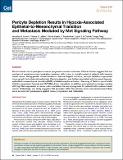Pericyte Depletion Results in Hypoxia-Associated Epithelial-to-Mesenchymal Transition and Metastasis Mediated by Met Signaling Pathway
Author(s)
Cooke, Vesselina G.; LeBleu, Valerie Sandra; Keskin, Doruk; Khan, Zainab; O’Connell, Joyce T.; Teng, Yingqi; Duncan, Michael B.; Xie, Liang; Maeda, Genta; Vong, Sylvia; Sugimoto, Hikaru; Rocha, Rafael M.; Damascena, Aline; Brentani, Ricardo R.; Kalluri, Raghu; ... Show more Show less
DownloadCooke-2012-Pericyte Depletion R.pdf (5.654Mb)
PUBLISHER_POLICY
Publisher Policy
Article is made available in accordance with the publisher's policy and may be subject to US copyright law. Please refer to the publisher's site for terms of use.
Terms of use
Metadata
Show full item recordAbstract
The functional role of pericytes in cancer progression remains unknown. Clinical studies suggest that low numbers of vessel-associated pericytes correlated with a drop in overall survival of patients with invasive breast cancer. Using genetic mouse models or pharmacological inhibitors, pericyte depletion suppressed tumor growth but enhanced metastasis. Pericyte depletion was further associated with increased hypoxia, epithelial-to-mesenchymal transition (EMT), and Met receptor activation. Silencing of Twist or use of a Met inhibitor suppressed hypoxia and EMT/Met-driven metastasis. In addition, poor pericyte coverage coupled with high Met expression in cancer cells speculates the worst prognosis for patients with invasive breast cancer. Collectively, our study suggests that pericytes within the primary tumor microenvironment likely serve as important gatekeepers against cancer progression and metastasis.
Date issued
2012-01Department
Harvard University--MIT Division of Health Sciences and TechnologyJournal
Cancer Cell
Publisher
Elsevier B.V.
Citation
Cooke, Vesselina G., Valerie S. LeBleu, Doruk Keskin, Zainab Khan, Joyce T. O’Connell, Yingqi Teng, Michael B. Duncan, et al. “Pericyte Depletion Results in Hypoxia-Associated Epithelial-to-Mesenchymal Transition and Metastasis Mediated by Met Signaling Pathway.” Cancer Cell 21, no. 1 (January 2012): 66–81. © 2012 Elsevier Inc.
Version: Final published version
ISSN
15356108